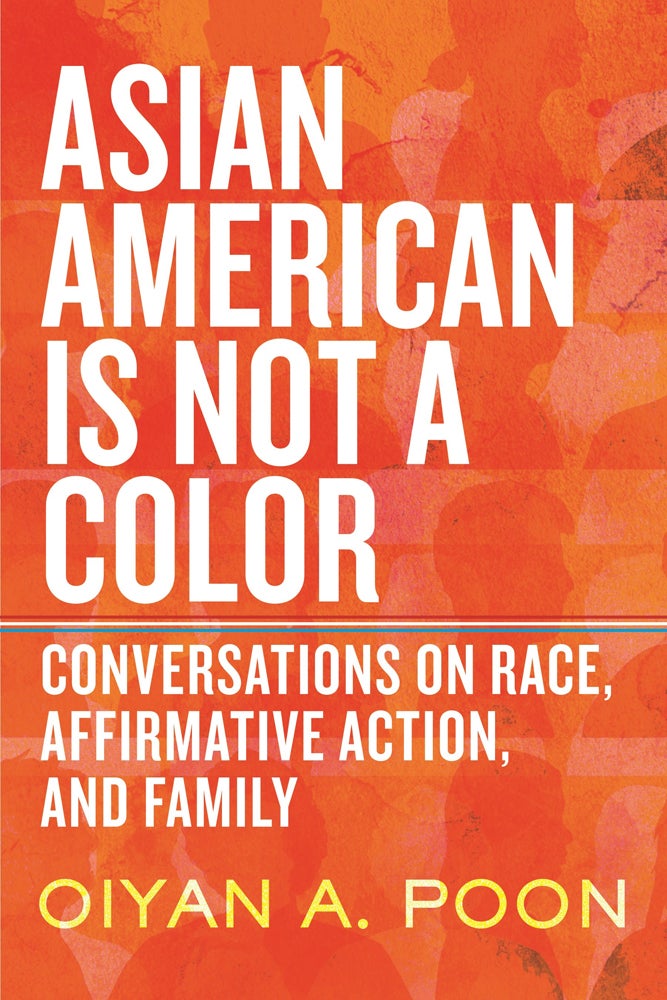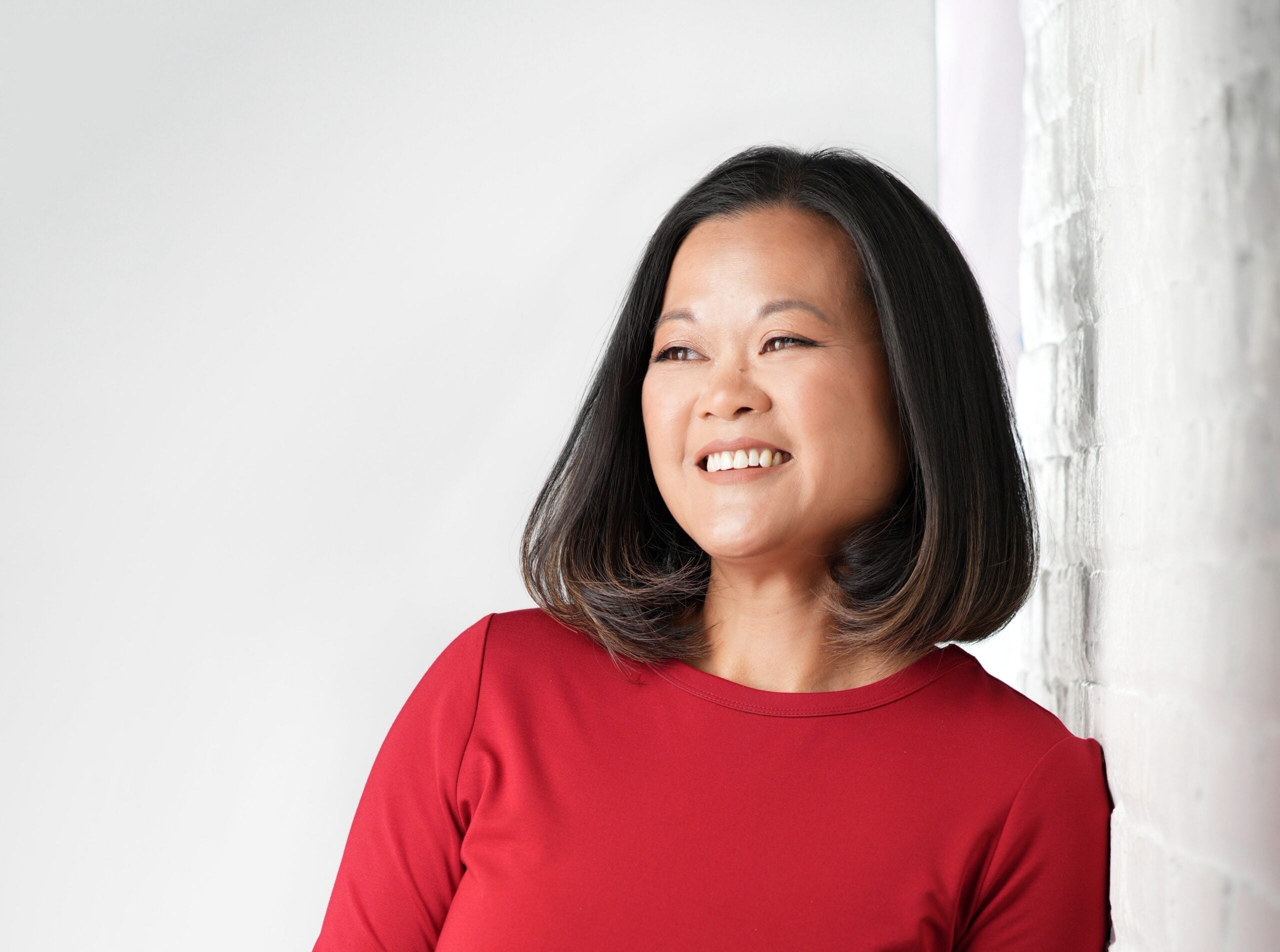New book by SSCE alumna, “Asian American is Not a Color” is a heartfelt discussion of race, affirmative action, identity, and family.
“Asian American is Not a Color: Conversations on Race, Affirmative Action, and Family,” a new book by OiYan Poon (’10, Ph.D., Social Science and Comparative Education), was inspired by a conversation with her daughter.
“When I became a mom and my daughter started asking questions as a toddler, that’s when I was like, Oh, wow! I don’t know how to answer some of her questions or help her understand these things, even as a race scholar,” recalls Poon, a scholar of race and education. “It was 2018. She was three, and she came home from preschool and [asked], “Mom, are we Black or are we white?” And I was like, “Oh, we’re Asian American.” She [said], “Mom, that’s not a color.”
“That [was] a brilliant observation, because that’s very true,” says Poon. “Asian Americans are all different colors. It’s much more complicated than just a color. It’s a political identity… the history. But how do you explain that to a three-year-old? I had no idea, and that was the moment that inspired me to consider writing a book, not necessarily [in] a scholarly way, but with the audience of my daughter in mind.”
Published earlier this year by Beacon Press, “Asian American is Not a Color” has won the 2024 Outstanding Book Award from the Association for the Study of Higher Education (ASHE). A book talk and signing event with Poon with take place at UCLA, in the James West Alumni Center on Wednesday, Oct. 30, 6:15-8:00 p.m.
Poon (’10, Ph.D., Social Science and Comparative Education) currently serves as co-director of the College Admissions Futures Co-Laborative and as a Senior Research Fellow for Education Equity at the NAACP LDF Thurgood Marshall Institute. In addition, she is a consultant to the State of Illinois, working with staff in the office of Governor JB Pritzker on issues of higher education.
An educator, author, and speaker, Poon was most recently a program officer at the Spencer Foundation and previously an associate professor of higher education leadership at the School of Education and director of the Race & Intersectional Studies for Education Equity Center at Colorado State University. Her research focuses on the racial politics and discourses of education access, higher education organization and policy, affirmative action, and Asian Americans.
Poon operates her own consulting firm, Public Pedagogy. She also holds one of the first graduate certificates in Asian American studies from UCLA. In the SSCE division, Poon’s emphasis was in race and ethnic studies, with the late UCLA Professor Don Nakanishi and Professor Daniel Solórzano as her co-advisors.
Poon shares her perspectives on the book and the important questions it asks and seeks to answer for educators and families.

Who – besides your daughter – is the intended audience for the book?
OiYan Poon: It’s really for anyone who wants to gain a deeper understanding about the complexities of race and racism in America through a lens of an Asian American identity, based on cross-racial solidarity. There’s a little bit of history in the book, and storytelling from my research. Every chapter opens and closes with a conversation or a question between myself and my daughter. It’s addressed to her, like a letter. And then, other readers, whoever they may be, are invited to join in a conversation between me and my daughter.
For instance, I just came from a conference here in Chicago, a national conference of DEI professionals in K-12, and equity advocates and professionals in K-12 education across the country. I gave a talk, drawing from the book, about how I am a professional race scholar but don’t know how to talk to my own child or people [about race]. I partner with early childhood educators, K-12 educators, people who have much more expertise in those areas. What the book is trying to do is just kick off a conversation.
What was your daughter’s reaction to the book?
Poon: She’s now nine-and-a-half, so it took six years between that question and the book. I think during the time I was writing it she was annoyed, because I was constantly busy, working a very demanding job at the Spencer Foundation and on the side, writing this book. But now that she’s a little bit older, she’s really excited about it. The funny thing is right before it came out, she asked if she could be listed as a co-author.
I [said], “I’m glad you asked, I like that boldness. But you didn’t really write anything.” Her argument was, “Well, if the title are my words, then I authored those words.”
Our compromise has been that whenever she’s with me, she gets to sign the book, or if we’re sending copies off, she gets to sign those. She loves that, she has so much fun with it. We just found out the book won the ASHE Outstanding Book Award for this year (2024), so I’ll be taking her to Minneapolis for that. I’m really grateful to Mike Hoa Nguyen, who is also a SSCE alum. He really generously coordinated the nomination.
How does the book address affirmative action?
Poon: In 2018, I had been analyzing data in a research study where in 2016 I had interviewed Asian Americans across the country about how they feel and why they feel the way they do about affirmative action. I have 36 different life stories of people who basically told me what it means to be Asian American through their conversations about affirmative action.
That’s how [the book] connects to affirmative action. I feel [that] how Asian Americans connect to this long-standing debate in education, and in racial politics more generally, has to do with what they think of as first, how they define racism or anti-Asian racism in particular and second, what they think is an appropriate solution to anti-Asian racism.
I think the book is applicable to policy issues beyond affirmative action, or even education, because what I was finding was that affirmative action was just a window into what they believed it meant to be Asian American, what racism was, and how to solve it in different ways.
The way I frame identity in the book to my daughter then, is that there are a lot of different ways to define what it means to be Asian American. I leave it open to her to decide, or I leave it open to the reader to decide. I end the book with my hopes as a mother for my third-generation Asian American daughter, and how she engages with the identity. We don’t tend to do that as academics, and it was really fun to be able to do it in this book.
Tell me if this is a dated question, but how do you approach the idea of the model minority?
Poon: I draw from sociology of race and Asian American studies on that. The term actually comes up one time in the book, towards the end. I have a Review of Educational Research article from 2016, around this idea of [being] really clear and theoretically grounded in the fact that the model minority myth was only partly about Asian Americans. It’s really an anti-Black racist device to [keep] people of color divided and essentially, conquered – it’s a political tool of division.
I see it too often misdefined as… a stereotype of high-achievement among Asian Americans. But where does the word model [come in]? What is it modeling, and who is it modeling for? Historically, it has always been about shaming anyone who says there’s such a thing as racism. The term emerged in the 1960s to basically say, “Hey, Black civil rights leaders, there’s no such thing as racism. Look at the Asians.”
I remember teaching undergrads at UCLA, and I’d ask them, “Have you heard of the model minority myth?” And they’d [say], “No.” But when when you think about political discourse and rhetoric, when you use the terms of people who are essentially the opponents, you’ve already lost the battle. So then, to explain what the model minority myth is, [would] then seed and entrench this idea yet again, rather than talking about the [real] problems that unfortunately, go unexplored in a deep way.
How does all of your experience and training as a race scholar support your current work as a consultant?
Poon: The College Admissions Future Collaborative is a network of research scholars like Julie Park, a UCLA HEOC alumna who is part of our team, Kelly Rosinger at Penn State, and Dominique Baker at the University of Delaware. We’re all part of this collective of research scholars – it’s been really fun to collaborate with them. Through the CAFCO-Lab, we’ve received a grant to work in a consulting role to the governor’s office in Illinois.
We talk a lot about the divide between research and policy or practice, and right now, it feels like I’m standing in the gap, at least here in Illinois. In this role, I meet with the very smart staff in the governor’s office and their team in education, and they ask me questions. And I’m like, “Oh, these are really interesting ideas, I know so-and-so in the field of research that has some analysis and data about this. Would you like to meet with them? Or, “Is this is someone we want to consider bringing to Springfield for a subject matter hearing… or as a speaker for a learning series for some of the higher ed leaders in the state, the university and community college leaders, so we can all learn together?”
It’s been a lot of fun in that way. I get to learn so much. Having learned from Pat McDonough about the misalignments between high schools and their curriculum, counseling staff supports, and college going [culture], I feel like I’m taking that learning and keeping it going with a new generation of scholars and bridging together policy leaders, institutional leaders, and research movers and shakers.
Does Illinois have collaborative work with other states?
Poon: Our country is so divided these days. But we have 50 states, and education is so state- based in many ways – especially higher education – that there are opportunities here. In Illinois we’re one of the few states in the Midwest that has the opportunity to really push an agenda for serving everybody in the state and trying new things that can close the equity gap. We’re not dealing with bans on diversity, equity, or inclusion.
For example, and I think there’s maybe one or two other states that have done this too, is Illinois has required all the public universities and colleges to submit equity plans. My hope is that we do so well here that all these states, governors, and leaderships that are all networked together and talk to each other, will look to Illinois as a model.
To attend the book talk and signing event on Oct. 30 with OiYan Poon, Ph.D., register here.
Photo by Anna Cillan
